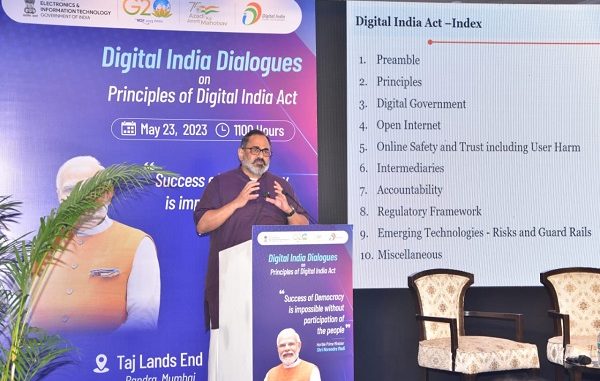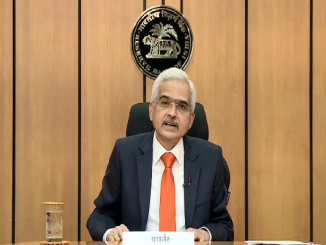
May 24: Union Minister of State for Skill Development and Entrepreneurship and Electronics and IT Rajeev Chandrasekhar today held Digital India Dialogues on the Principles of the Digital India Act, a future-ready legislation that aims to replace the existing IT Act and provide a strong legal framework for protecting the rights of the Digital nagriks while ensuring an enabling environment for innovation and growth.
Referring to DIA’s basic principles, Shri Rajeev Chandrasekhar said the Act seeks to harmonise everything that’s going on in the tech space. Talking about Safety & Trust, the Minister mentioned “Safety and Trust will be at the heart of the DIA, and it is going to be a huge section in the DIA. Online harm is also being dealt with by regulators globally. India is soon going to have 1.3 billion people accessing the internet and these Digital Nagriks should approach the internet without any fear and mistrust, especially as many government services also move to the internet. Safe and trusted internet is a win-win for all stakeholders. The weaponisation of misinformation and disinformation is also a major concern that needs to be addressed, especially with the added catalyst of AI-driven deep fakes”
While responding to questions from stakeholders on the issue of sectoral regulation, the Hon’ble Minister also clarified various other issues including:
- On the issue of intersecting regulation by sectoral regulators: DIA will allow sectoral regulators such as RBI and SEBI and other ministries to create additional safeguards. The DIA will result in the harmonization of different laws and sectoral regulators will be consulted for this purpose.
- On the issue of regulating emerging technologies: AI will be regulated through the prism of user harm. The objective is to ensure that emerging technologies should not cause any harm to Digital Nagariks. Similarly, the industry can suggest guardrails for blockchain and Web 3.0. We will not ban anything in the innovation space unless it is linked with user harm. We want to lead the charge in Web 3.0 and in AI–with guardrails defined. I am not a big fan of regulators in the sense that they shouldn’t create another layer of compliance.
- On the issue of compliance for startups: The Hon’ble Minister emphasized that in all recent laws, such as the CERT-In directions released in April 2022 or the upcoming Digital Personal Data Protection Bill, 2023, startups have either been provided exemptions or an extended time period for compliance.
The proposed law will be an important pillar of the Global Standard Cyber law framework that is being formulated by the Government for catalyzing India’s digital economy goals. Digital Personal Data Protection Bill, National Data Governance Framework policy, the recent amendments to the IT Rules, and CERT-In guidelines will form the other elements of this framework.
The session was attended by a diverse range of stakeholders of the technology ecosystem including industry associations, startups, IT professionals, think tanks and lawyers. Around 300 stakeholders attended the consultation, with 125 people attending in person and 175 attending virtually. A similar dialogue was held in Bengaluru in March this year.
These consultations are in line with Prime Minister Narendra Modi’s consultative approach to law and policy-making. This is the first time the consultations are taking place on the principles of the Bill.
Disclaimer: We donot claim that the images used as part of the news published are always owned by us. From time to time, we use images sourced as part of news or any related images or representations. Kindly take a look at our image usage policy on how we select the image that are used as part of the news.


